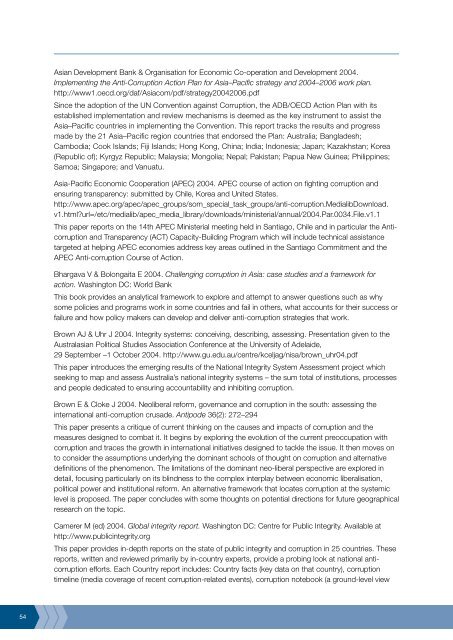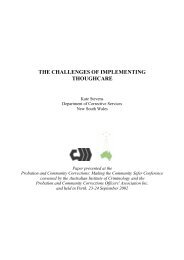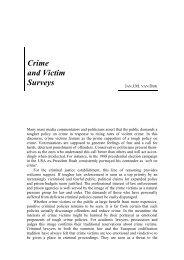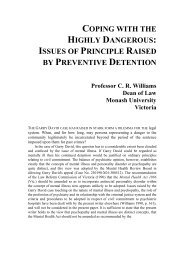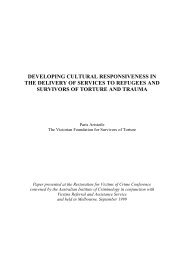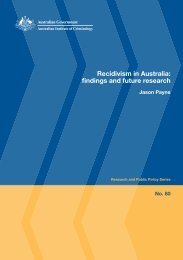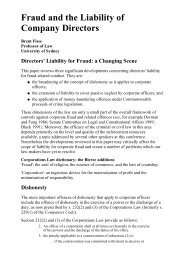Review of anti-corruption strategies Rob McCusker - Australian ...
Review of anti-corruption strategies Rob McCusker - Australian ...
Review of anti-corruption strategies Rob McCusker - Australian ...
Create successful ePaper yourself
Turn your PDF publications into a flip-book with our unique Google optimized e-Paper software.
Asian Development Bank & Organisation for Economic Co-operation and Development 2004.<br />
Implementing the Anti-Corruption Action Plan for Asia–Pacific strategy and 2004–2006 work plan.<br />
http://www1.oecd.org/daf/Asiacom/pdf/strategy20042006.pdf<br />
Since the adoption <strong>of</strong> the UN Convention against Corruption, the ADB/OECD Action Plan with its<br />
established implementation and review mechanisms is deemed as the key instrument to assist the<br />
Asia–Pacific countries in implementing the Convention. This report tracks the results and progress<br />
made by the 21 Asia–Pacific region countries that endorsed the Plan: Australia; Bangladesh;<br />
Cambodia; Cook Islands; Fiji Islands; Hong Kong, China; India; Indonesia; Japan; Kazakhstan; Korea<br />
(Republic <strong>of</strong>); Kyrgyz Republic; Malaysia; Mongolia; Nepal; Pakistan; Papua New Guinea; Philippines;<br />
Samoa; Singapore; and Vanuatu.<br />
Asia-Pacific Economic Cooperation (APEC) 2004. APEC course <strong>of</strong> action on fighting <strong>corruption</strong> and<br />
ensuring transparency: submitted by Chile, Korea and United States.<br />
http://www.apec.org/apec/apec_groups/som_special_task_groups/<strong>anti</strong>-<strong>corruption</strong>.MedialibDownload.<br />
v1.html?url=/etc/medialib/apec_media_library/downloads/ministerial/annual/2004.Par.0034.File.v1.1<br />
This paper reports on the 14th APEC Ministerial meeting held in S<strong>anti</strong>ago, Chile and in particular the Anti<strong>corruption</strong><br />
and Transparency (ACT) Capacity-Building Program which will include technical assistance<br />
targeted at helping APEC economies address key areas outlined in the S<strong>anti</strong>ago Commitment and the<br />
APEC Anti-<strong>corruption</strong> Course <strong>of</strong> Action.<br />
Bhargava V & Bolongaita E 2004. Challenging <strong>corruption</strong> in Asia: case studies and a framework for<br />
action. Washington DC: World Bank<br />
This book provides an analytical framework to explore and attempt to answer questions such as why<br />
some policies and programs work in some countries and fail in others, what accounts for their success or<br />
failure and how policy makers can develop and deliver <strong>anti</strong>-<strong>corruption</strong> <strong>strategies</strong> that work.<br />
Brown AJ & Uhr J 2004. Integrity systems: conceiving, describing, assessing. Presentation given to the<br />
Australasian Political Studies Association Conference at the University <strong>of</strong> Adelaide,<br />
29 September –1 October 2004. http://www.gu.edu.au/centre/kceljag/nisa/brown_uhr04.pdf<br />
This paper introduces the emerging results <strong>of</strong> the National Integrity System Assessment project which<br />
seeking to map and assess Australia’s national integrity systems – the sum total <strong>of</strong> institutions, processes<br />
and people dedicated to ensuring accountability and inhibiting <strong>corruption</strong>.<br />
Brown E & Cloke J 2004. Neoliberal reform, governance and <strong>corruption</strong> in the south: assessing the<br />
international <strong>anti</strong>-<strong>corruption</strong> crusade. Antipode 36(2): 272–294<br />
This paper presents a critique <strong>of</strong> current thinking on the causes and impacts <strong>of</strong> <strong>corruption</strong> and the<br />
measures designed to combat it. It begins by exploring the evolution <strong>of</strong> the current preoccupation with<br />
<strong>corruption</strong> and traces the growth in international initiatives designed to tackle the issue. It then moves on<br />
to consider the assumptions underlying the dominant schools <strong>of</strong> thought on <strong>corruption</strong> and alternative<br />
definitions <strong>of</strong> the phenomenon. The limitations <strong>of</strong> the dominant neo-liberal perspective are explored in<br />
detail, focusing particularly on its blindness to the complex interplay between economic liberalisation,<br />
political power and institutional reform. An alternative framework that locates <strong>corruption</strong> at the systemic<br />
level is proposed. The paper concludes with some thoughts on potential directions for future geographical<br />
research on the topic.<br />
Camerer M (ed) 2004. Global integrity report. Washington DC: Centre for Public Integrity. Available at<br />
http://www.publicintegrity.org<br />
This paper provides in-depth reports on the state <strong>of</strong> public integrity and <strong>corruption</strong> in 25 countries. These<br />
reports, written and reviewed primarily by in-country experts, provide a probing look at national <strong>anti</strong><strong>corruption</strong><br />
efforts. Each Country report includes: Country facts (key data on that country), <strong>corruption</strong><br />
timeline (media coverage <strong>of</strong> recent <strong>corruption</strong>-related events), <strong>corruption</strong> notebook (a ground-level view


